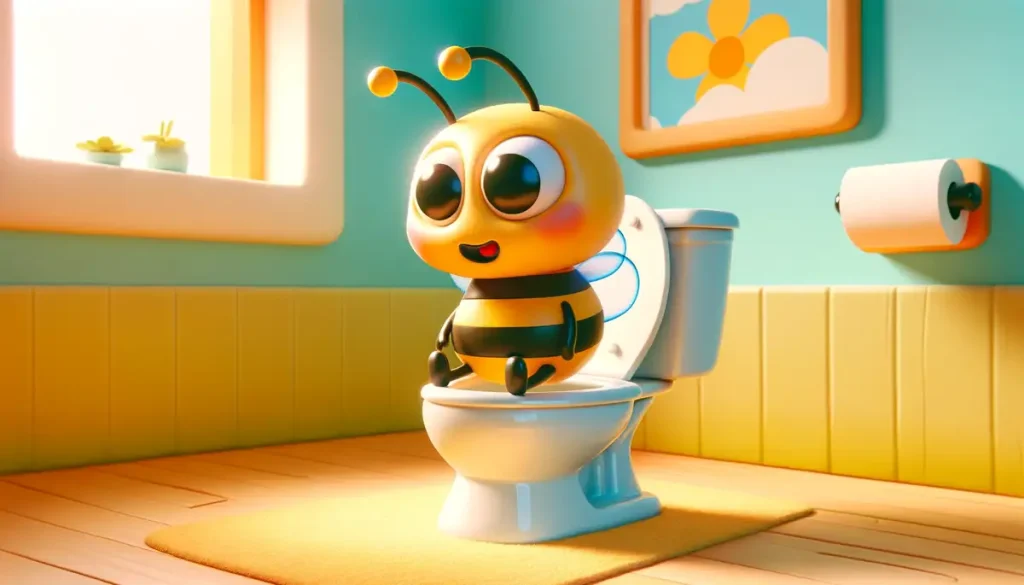Table of Contents
Yes, bees do poop. Similar to many other animals, bees have a digestive system and excrete waste. Their feces, or “bee poop,” is typically expelled outside the hive to maintain cleanliness within their living quarters. Bee poop is usually yellowish or brownish in color, and seeing small dots of it outside the hive is a normal and healthy sign of bee activity.
In the below paragraphs, we will take a more detailed look at this topic.
Most topics relating to beekeeping make for fascinating discussions over a hot cup of coffee or a cold beer. But there is one exception: bee excrement. If you are like most people, you have never discussed bee poop with your friends. But since the topic has been brought up, do bees poop?
In a word, yes. Bees are living organisms that produce waste from the food they eat. That waste has to go somewhere. Just like nearly every other creature on the planet, bees of all species do defecate.
Key Takeaways
- Bees do poop, and their waste is called frass.
- Bees excrete waste outside their hives or nests to avoid sanitation issues.
- Bees eliminate waste through the same opening they use for mating and laying eggs.
- How often bees poop depends on their age, diet, and environment.
- Bees do not pee because their digestive system works differently from humans and other animals.
- Bee waste is not toxic to humans or animals.
- Bees are able to conserve water in their waste material, helping them maintain their hydration levels.
- Bees typically fly away from the hive to poop, so droppings may be seen near the entrance of the hive.
How Often Do Bees Poop?
Bees, like most living creatures, need to eliminate waste from their bodies. However, unlike humans they do not have a dedicated organ or opening for this purpose. Instead, they excrete waste through the same opening they use for mating and laying eggs. This opening is called the proctodeum or rectum and it is located at the end of the bee’s abdomen.
How often bees poop depends on several factors including the bee’s age, diet, and environment. Adult worker bees, for example, typically defecate outside the hive once every 20-40 minutes during the day. This frequency can increase or decrease depending on the season and the availability of food and water. Bees also tend to defecate more often when they are preparing to forage as a way to lighten their load and maximize their flying efficiency.
Interestingly, bees exhibit a remarkable level of hygiene and cleanliness when it comes to defecation. They try avoid soiling the inside of the hive as much as possible and instead will fly a short distance away to eliminate waste. This behavior is essential for maintaining the hive’s cleanliness and preventing the spread of disease.
During the winter months though, bees face a unique challenge. Since they are unable to fly in cold temperatures, they must stay inside the hive for extended periods. This confinement can make it difficult for bees to defecate regularly, leading to a build-up of waste inside the hive. To avoid this bees will try to hold their waste for as long as possible, sometimes for several months. Once the weather warms up enough for them to venture outside, they will relieve themselves immediately.
Do Bees Poop While Flying?
The short answer to this question is yes, bees do poop while flying. Unlike some other insects that can only defecate while stationary, bees are capable of letting it go in mid-flight. The reason behind this is that bees are incredibly efficient creatures that prioritize their tasks and minimize waste of time and energy. Hence, stopping to poop would be a significant waste of their time and energy, which they cannot afford.
Established Flight Paths of Bees
Bees are not only efficient in their tasks but also incredibly organized creatures that follow established flight paths. These routes are like bee highways in the sky. Once a group of worker bees has established a route to and from a source of food, they will use that route until the food source is exhausted. As a result, poop trails can be observed along these flight paths.
Identifying Bee Poop Trails
Identifying bee poop trails is not difficult once you know what to look for. Bee poop is usually a yellowish-brown color and can be found on leaves, branches, and other surfaces. It often appears as small droplets; when found in a line it indicates the direction of the flight path. You may also notice a distinct odor that resembles the smell of honey or fermenting fruit.
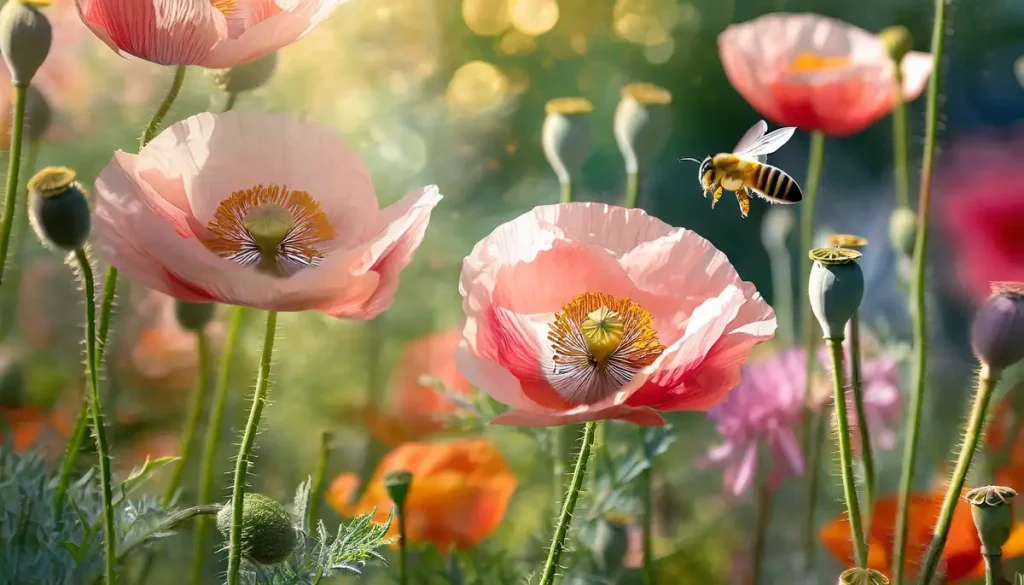
What Does Bee Poop Look Like?
Bee poop is typically a sticky, yellowish-brown substance that can vary in appearance depending on a bee’s diet. The color of bee poop can range from bright yellow to dark brown, and it may appear opaque or translucent depending on the amount of pollen present. Bee poop could also have a grainy or lumpy texture, which is due to the presence of pollen grains.
- Carter, Anthony (Author)
- English (Publication Language)
- 194 Pages - 02/28/2024 (Publication Date) - Independently published (Publisher)
The Importance of Bee Poop
Bee poop serves several important functions in the life of a bee. First, it helps to eliminate waste products from the bee’s body, which is essential for maintaining good health. Second, it provides important information about a bee’s diet and the quality of the environment it lives in. For example, if a bee is consuming a lot of pollen from a particular plant species, its frass may contain high levels of pollen from that plant. This can provide insight into which plants are important sources of food for bees in a particular area.
In addition to providing information about a bee’s diet, frass can also be used to diagnose and monitor bee diseases. Some bee diseases can cause changes in the appearance and composition of frass, which can help beekeepers and researchers to identify and track the spread of these diseases. For example, American Foulbrood disease, a bacterial disease that can be deadly to honeybees, can cause frass to become dark and watery with a foul odor.
Is Honey Bee Poop?
One common misconception is that honey is bee poop. In reality, honey is not bee poop; it is the product of nectar collected by bees from various flowers. Bees have a separate digestive process for excreting waste. Honey is made from nectar that is collected, partially digested, and then regurgitated by bees to be stored as food in the honeycomb. The process of making honey involves enzymes in the bees’ stomachs that help break down the nectar into simpler sugars, which is then deposited into honeycomb cells and eventually evaporates into the thick, sweet substance we know. Bee poop, on the other hand, is a separate excretion that bees typically do outside the hive during what are known as “cleansing flights.”
Bee Diseases Related to Poop
Bee poop, while not a topic of everyday conversation, can serve as a valuable tool in diagnosing and monitoring the health of a bee colony. Changes in the color, consistency, or frequency of bee poop can often be indicative of underlying health issues.
Nosema
One of the most common diseases associated with changes in bee poop is Nosema, a fungal infection that affects the digestive systems of bees. Infected bees often exhibit symptoms such as diarrhea and discolored feces, typically a yellow-green color. This disease can be particularly harmful during the winter months when bees are unable to leave the hive to defecate, leading to contamination and spread of the disease within the hive.
American Foulbrood
Another disease that can be identified through changes in bee poop is American Foulbrood, a highly contagious bacterial disease that can be deadly to honeybee larvae. Infected larvae often excrete a dark, foul-smelling poop. Beekeepers can monitor for this disease by looking for signs of irregular or discolored poop in the cells of the honeycomb.
Varroa Mites
In addition to these diseases, the presence of parasites such as Varroa mites can also be detected through changes in bee poop. Bees infested with these mites often produce poop that is lighter in color and more watery in consistency.
Below is a simplified table to help illustrate some diseases, their causes, symptoms, and treatments as related to bee poop. Please note that this table is not exhaustive and further research and consultation with experts in the field is recommended for a more detailed understanding.
| Disease Name | Causative Agent | Symptoms | Treatment |
|---|---|---|---|
| Nosema | Nosema apis | Dysentery, Fecal staining around hive entrance | Fumagillin |
| European Foulbrood (EFB) | Melissococcus plutonius | Discoloration and irregular shape of larvae, Fecal material in cells | Antibiotics like Oxytetracycline |
| Chalkbrood | Ascosphaera apis | Hard mummies of larvae, often with fecal material around | Improved hive ventilation, Requeening |
The table above briefly covers the diseases, causative agents, symptoms, and treatment options. Beekeepers and those interested in bee health should seek further information and professional advice to ensure effective management and treatment of bee diseases.
Monitoring bee poop can thus provide valuable insights into the health of a bee colony and enable early detection and treatment of diseases. However, it’s important to note that changes in bee poop can also be influenced by factors such as diet and environmental conditions, so any unusual observations should be followed up with further investigation.
Do Bees Pee?
The answer is no, bees do not pee. Instead, they excrete a substance known as meconium, which is a combination of solid and liquid waste material. This waste is stored in the rectum until it is expelled from the bee’s body during defecation.
Why Don’t Bees Pee?
The reason bees don’t pee is because their digestive system works differently from humans and other animals. In human digestion, liquids and solids are separated in the stomach and intestines and the liquid waste is filtered by the kidneys and expelled from the body as urine.
In bees though, liquids and solids are combined in the digestive tract. The solid waste is mixed with uric acid, which would normally be excreted as urine in humans and other animals. This combination of solid and liquid waste is then expelled from the bee’s body as meconium.
What Happens to the Water in Bee Waste?
One interesting aspect of bee waste is that the rectum is capable of absorbing up to 90% of the remaining water in the waste material. This means that by the time the meconium is expelled from the bee’s body it is already quite dry.
The ability of the bee’s rectum to absorb water is an important adaptation for bees as it helps them conserve water in their bodies. Bees require water to survive, and they are often seen collecting water from flowers and other sources. By conserving water in their waste material, bees are able to maintain their hydration levels more effectively.
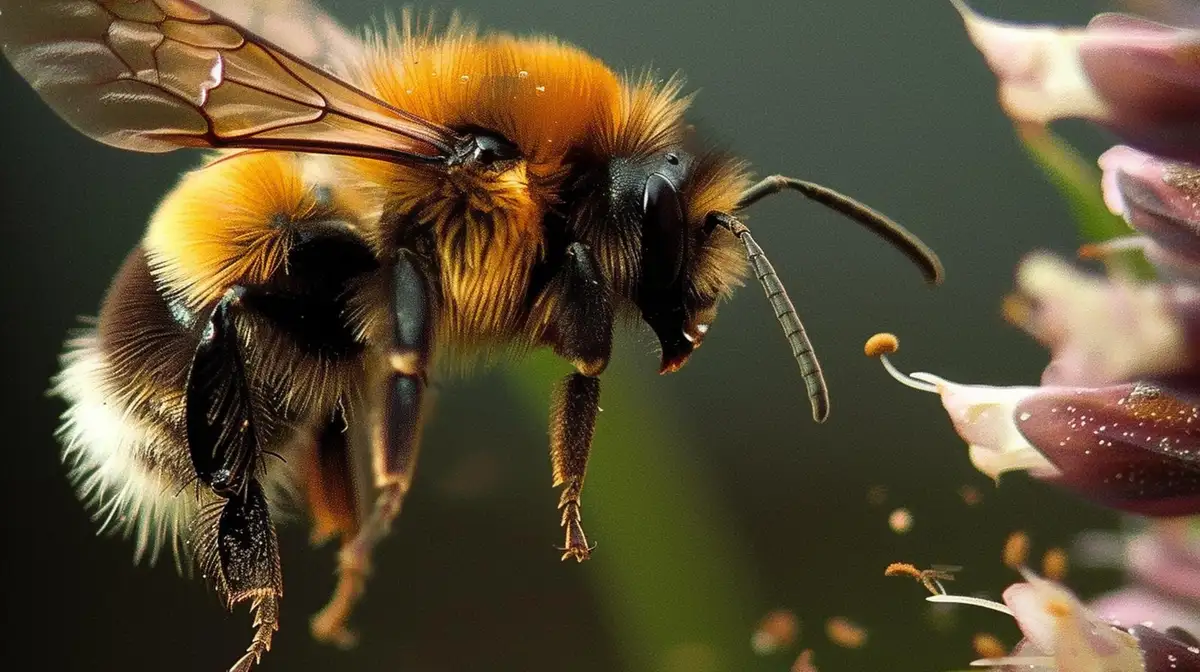
Bee Anatomy and Digestive System
Bees, like all insects, have a complex yet efficient anatomy that allows them to perform their daily tasks with precision. One of the most intriguing aspects of bee anatomy is their digestive system, which is uniquely adapted to their diet and lifestyle.
Mandibles and Proboscis
The bee’s digestive system begins with the mouth, where they use their mandibles and proboscis (a long, straw-like tongue) to ingest nectar and pollen. This food then travels down the esophagus and into the crop, also known as the honey stomach. The crop serves as a temporary storage tank where nectar and pollen are mixed and stored during foraging flights.
Primary Digestion Site
From the crop, the food mixture moves into the midgut, which is the bee’s primary site of digestion and absorption. Here, enzymes break down the food, allowing the bee to absorb necessary nutrients. Pollen, in particular, provides bees with proteins, while nectar offers sugars for energy.
The remaining undigested food, now considered waste, moves into the hindgut, which includes the rectum. Here, water is reabsorbed, making the waste relatively dry by the time it is ready to be excreted. This process is crucial for bees as it helps them conserve water, a vital resource for their survival.
The Multi-Use Proctodeum
Interestingly, bees excrete waste through the same opening they use for mating and laying eggs, known as the proctodeum or rectum. This is located at the end of the bee’s abdomen. The frequency and manner of their defecation are influenced by factors such as age, diet, and environmental conditions.
Here’s a simplified table illustrating the major components, functions, and characteristics of a bee’s digestive system:
| Component | Function | Characteristics |
|---|---|---|
| Mouthparts | Ingestion of food | Modified for nectar sucking, including mandibles and proboscis. |
| Salivary Glands | Produce enzymes to initiate digestion | Secrete amylase for carbohydrate breakdown. |
| Crop (Honey Stomach) | Temporary storage of nectar | Can expand to hold large amounts of nectar. |
| Proventriculus | Regulates entry of food into the midgut | Acts as a valve. |
| Midgut (Ventriculus) | Main site of digestion and absorption | Enzymes break down proteins and lipids. |
| Malpighian Tubules | Excretion and osmoregulation | Remove waste materials from the hemolymph. |
| Hindgut | Absorbs water and minerals; forms and expels feces | Comprises the ileum and rectum. |
Each of these components play a crucial role in the process of ingesting and digesting food, absorbing nutrients, and excreting waste. The structure and function of the digestive system enable bees to efficiently process their primary food sources, such as nectar and pollen, to sustain their energy needs and support the hive’s functionality.
Understanding the bee’s digestive system not only provides insight into their feeding and waste elimination habits but also underscores the remarkable adaptations these creatures have evolved to thrive in their environments.
Diarrhea in Bees
When it comes to the fascinating world of bees, every tiny aspect mirrors a grand narrative of nature’s intricate design. Now, envision a scenario where our industrious little friends face a bout of diarrhea, much like humans do. The underlying cause often circles back to their diet or exposure to harmful pathogens. Just like that spoiled takeout may send you rushing to the loo, contaminated nectar can spell trouble for a bee’s digestive tract. And it’s not just a bee’s personal ordeal.
Diarrhea, signifying a possible infection, can pose a serious threat to the entire colony’s health, much like a stomach bug making rounds in a human household. Moreover, spotting a case of bee diarrhea isn’t as grotesque as it sounds; a vigilant beekeeper might notice unusual streaks of colors on the hive, a telltale sign of a digestive mishap. Through such minute observations, a subtle dance between the beekeepers and the bees unfolds, nurturing a healthy habitat for these essential pollinators.
So the next time you enjoy the sweetness of honey, remember the delicate balance that sustains the buzzing life, and how the seemingly mundane matters like diarrhea, play a role in the grand scheme.
Do Bees Fart
Ah, the age-old inquiry that has perplexed many a mind: do bees break wind? Well, it’s not as simple as a ‘yes’ or ‘no’ answer. You see, bees have a rather efficient digestive system that primarily deals with liquids. Nectar, their main diet, goes down quite smoothly with hardly a hiccup, or a toot in this case. However, when they occasionally indulge in solid meals, like pollen, things get a bit more… gassy.
Their tiny tummies process these solids and produce a modest amount of gas. However, whether this gas exits the rear end in a melodious fashion remains a mystery to science. Yet, if bees do indeed fart, it’s likely the tiniest, most polite poots you could ever imagine.
So the next time you find yourself amidst a buzzing garden, ponder not just the birds and the bees, but the potential symphony of minuscule bee flatulence playing a whimsical tune in the background.
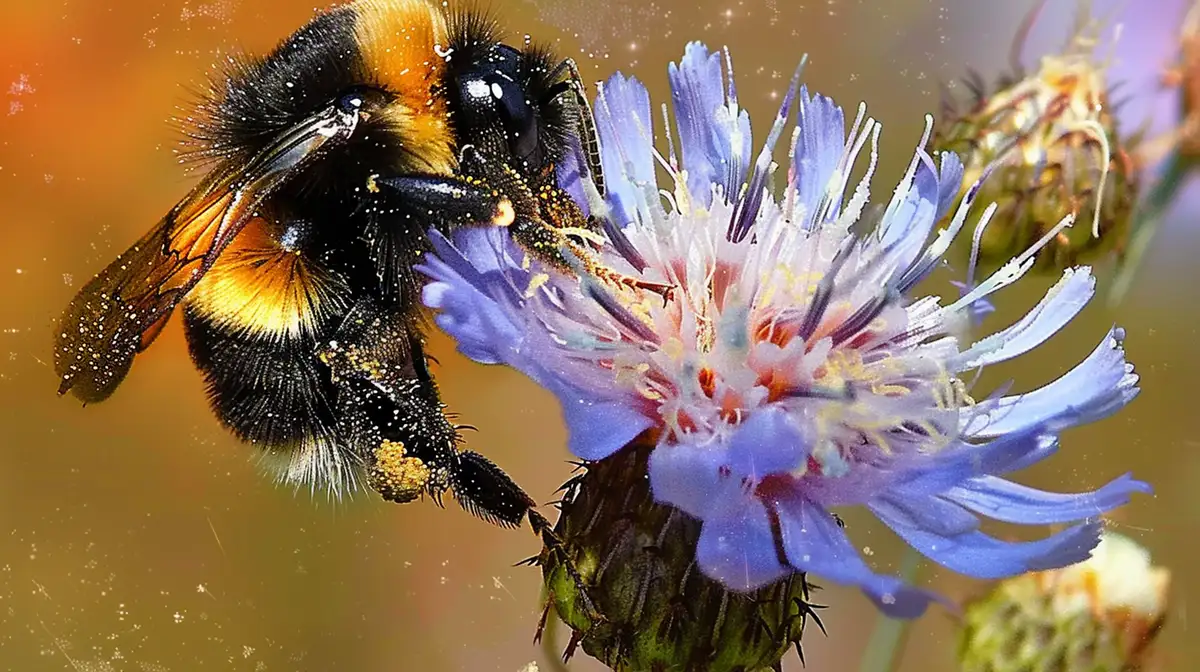
Do Bees Poop Pollen?
As fascinating as it may sound, bees do not actually poop pollen. Pollen is an essential component of the bee’s diet and plays a crucial role in pollination. However, bees do not excrete solid pollen particles in their feces. Instead, pollen undergoes a process of digestion in the bee’s body before being eliminated.
When bees collect pollen from flowers, they use their tongue and mandibles to scrape and gather pollen grains. The pollen is then mixed with nectar and stored in the bee’s crop, which acts as a temporary storage tank. The crop is located in the bee’s esophagus and can hold up to 50 mg of nectar and pollen.
Once the bee returns to the hive, it regurgitates the nectar and pollen mixture into a cell. At this point, the pollen has already been broken down and partially digested in the crop. The digestive process continues in the midgut, where enzymes and acids further break down the pollen particles. The midgut is responsible for the absorption of nutrients and water, which are vital for the bee’s survival.
After the nutrients are absorbed the remaining waste products move into the hindgut, which is also known as the rectum. The hindgut is responsible for the reabsorption of water and the elimination of solid waste. The leftover waste from the digestive process, which includes partially digested pollen particles, is then excreted from the bee’s body in the form of feces.
Poop Comparison with Other Insects
When it comes to the world of insects, the diversity in their biological processes, including excretion, is truly fascinating. Let’s take a moment to compare bee excrement with that of other insects to better understand the unique characteristics of bees.
Butterflies, for instance, are known to excrete a red liquid called “meconium” shortly after they emerge from their chrysalis. This is a waste product accumulated during their pupal stage, quite different from the regular excrement of bees. Ants, another group of social insects like bees, have a designated “waste pile” in their colonies where they deposit their excrement. This is a stark contrast to bees, who maintain cleanliness by flying away from the hive to defecate.
Termites, on the other hand, utilize their feces in a very different way. They mix it with chewed wood to construct their nests, demonstrating a unique way of recycling waste. This is a far cry from bees, who keep their hives immaculate and free from waste.
In the case of aphids, their waste, known as “honeydew,” is a sweet substance that’s actually sought after by other insects, including some species of ants, who ‘farm’ aphids for it. As mentioned, bees ensure their waste is expelled away from their hive; it certainly doesn’t serve as a food source for other creatures.
In essence, while all insects have evolved to manage their waste in ways that best suit their lifestyle and environment, bees stand out for their remarkable hygiene and the unique characteristics of their excrement. This comparison not only highlights the fascinating diversity of the insect world but also underscores the unique behaviors that make bees such an integral part of our ecosystem.
The excretion process in insects is quite different from mammals due to their unique digestive systems and excretory organs, like the Malpighian tubules. Below is a basic table illustrating the pooping habits of a few common insects:
| Insect | Frequency of Excretion | Method of Excretion | Additional Notes |
|---|---|---|---|
| House Fly | Frequent | Solid/Liquid | Often excrete while flying. |
| Honey Bee | Varied | Solid | Typically excrete outside the hive. |
| Ant | Regular | Solid/Liquid | Have designated waste areas in colonies. |
| Cockroach | Regular | Solid | Excretion can attract other cockroaches. |
| Butterfly | Varied | Liquid | Caterpillars excrete more frequently than adult butterflies. |
| Ladybug | Varied | Solid | Excretion can serve as a defense mechanism. |
Note:
- The frequency of excretion can be influenced by factors such as diet, temperature, and the insect’s level of activity.
- Some insects have unique excretion habits; for example, certain caterpillars use their feces as a defense mechanism.
- The method of excretion (solid/liquid) may change depending on the insect’s life stage and diet.
Keep in mind that this table is highly simplified and the excretion habits of insects can be more complex and varied than what’s shown here.
Is Bee Poop Toxic?
While it may not be the most pleasant thing to come across, bee poop is not toxic to humans or animals.
The Origins of the Toxicity Myth
The notion that bee poop is toxic likely originated from a series of events that took place in Southeast Asia in the early 1980s. Refugees fleeing Vietnam claimed that communist forces were dropping a yellow substance from the sky, which caused physical symptoms of biological warfare. However, an investigation revealed that the yellow substance was actually bee poop, and the physical symptoms were the result of fungal infections, not the bee poop itself.
Since then, the myth of bee poop toxicity has persisted, despite there being no scientific evidence to support it. In fact, bee poop is entirely natural and can even be beneficial in some cases.
Benefits of Bee Poop
While bee poop may not be the most appealing substance, it can actually have some benefits. Bee poop contains nutrients and minerals that can enrich soil and promote healthy plant growth. In fact, some gardeners and farmers even use bee poop as a natural fertilizer.
Additionally, bee poop can serve as an indicator of the health of a bee colony. If bee poop is absent, it may be a sign that the bees are not thriving or are experiencing health issues.
Bee Poop and Human Health
When it comes to the question of is bee poop harmful to human health, it’s important to dispel any lingering myths and misconceptions. As previously mentioned, bee poop is not toxic to humans. It’s a natural byproduct of bees’ digestion process and, while not exactly pleasant to encounter, it poses no direct harm to us. is bee poop harmful
However, it’s worth noting that bee poop can sometimes be a nuisance, especially for beekeepers or those living near beehives. The droppings, often appearing as small yellow or brown spots, can accumulate on outdoor surfaces, such as cars or patio furniture. While this is generally harmless, in rare cases, individuals with certain allergies might experience reactions. It’s always a good idea to clean any surfaces where bee poop has accumulated, using warm soapy water or a mild bleach solution.
On the flip side, bee poop can also have indirect benefits for human health. As mentioned earlier, bee poop can serve as a natural fertilizer, enriching the soil and promoting the growth of plants. This, in turn, supports the growth of fruits, vegetables, and other plants that contribute to human nutrition. Moreover, by supporting the health of plants, bee poop also contributes to the overall health of our ecosystems, which is essential for human well-being.
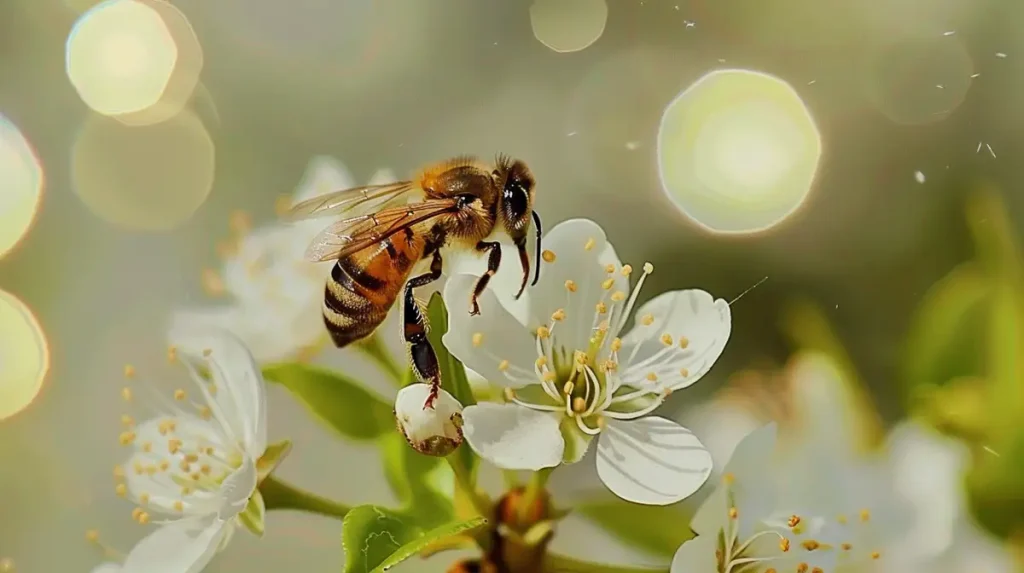
Impact of Bee Poop on the Environment
Bee Poop as a Natural Fertilizer
Bee poop, often overlooked, plays a surprisingly significant role in our ecosystems. One of the most direct impacts is its role as a natural fertilizer. When bees defecate, they deposit a rich mixture of nutrients back into the soil. This nutrient-rich waste, known as ‘frass’, contains nitrogen, phosphorus, and potassium – three essential nutrients for plant growth.
As bees forage and defecate, they effectively distribute these nutrients across a wide area, enriching the soil in their flight paths. This nutrient distribution can be particularly beneficial in nutrient-poor environments, where the input of essential elements can stimulate plant growth and productivity.
Nutrient Cycling and Ecosystem Health
Beyond fertilization, bee poop plays a role in nutrient cycling, a crucial ecological process. Nutrient cycling refers to the movement and exchange of organic and inorganic matter back into the production of living matter. The nutrients in bee poop, once returned to the soil, become available for uptake by plants, contributing to this cycle.
Moreover, the nutrients in bee poop can also be utilized by a variety of microorganisms in the soil. These microorganisms break down the waste, further releasing nutrients and enhancing soil fertility. This process contributes to the overall health and resilience of ecosystems, supporting biodiversity and promoting the growth of a wide variety of plant species.
Bee Poop in Beekeeping Practices
Beekeeping, or apiculture, is a practice that requires a keen understanding of bee behavior and biology. One aspect that is often overlooked, but is integral to maintaining a healthy hive, is the management of bee poop.
Beekeepers face a unique set of challenges and benefits when it comes to bee excrement. On one hand, bee poop can be a nuisance, especially when bees are kept in urban areas. The droppings can accumulate on nearby cars, windows, and outdoor furniture, which can lead to complaints from neighbors. This is particularly noticeable during the first warm days of spring, when bees take their “cleansing flights” after holding in their waste during the cold winter months.
On the other hand, bee poop can serve as a valuable tool for beekeepers. The color, consistency, and location of bee droppings can provide important clues about the health and behavior of the hive. For example, discolored or unusually smelly droppings can be an early sign of disease in the hive, allowing beekeepers to take action before the problem becomes more serious.
Moreover, bee poop can also be seen as a benefit in beekeeping. As mentioned earlier, bee poop is rich in nutrients and can be used as a natural fertilizer. Some beekeepers collect bee droppings and use them to enrich the soil in their gardens, turning a potential nuisance into a valuable resource.
Do Bees Poop – The Last Word
Bee poop may not be the most glamorous topic in beekeeping, but it is a natural and essential part of the life of bees. Bees defecate regularly to eliminate waste from their bodies, and they exhibit remarkable cleanliness and hygiene when doing so. While bee poop may not be toxic to humans or animals, it can provide important information about a bee’s diet, environment, and health. Furthermore, bee poop can have beneficial uses such as enriching soil and promoting healthy plant growth. So, while you may never have thought about bee poop before, it is just another fascinating aspect of these incredible creatures that make them so unique and important to our world.
FAQs
Q: What do bee droppings look like? A: Bee droppings are small and usually yellow or brown in color. They are often described as looking like tiny grains of rice.
Q: Where do bees poop? A: Bees typically fly away from the hive to poop, so you may see droppings on the ground near the entrance of the hive.
Q: Why do bees need to poop? A: Like all animals, bees need to eliminate waste from their bodies to maintain their health.
Q: How often do bees poop? A: Bees poop regularly, with some bees pooping every 20 minutes or so.
Q: Do bees poop inside the hive? A: No, bees do not typically poop inside the hive as it would be unsanitary.
Q: Are bee droppings harmful to humans? A: Bee droppings are generally not harmful to humans, but they may be considered a nuisance.
Q: Can you tell if a bee is about to poop? A: There are no visible signs that a bee is about to poop, but some beekeepers have observed that bees may pause briefly before flying away from the hive to poop.
Q: Is it true that bees only poop once in their lifetime? A: No, this is a myth. Bees poop regularly throughout their lifespan.
Q: How can I clean up bee droppings? A: Bee droppings can be cleaned up with warm soapy water or a mild bleach solution. Be sure to wear gloves and dispose of any contaminated materials properly.
Q: Do all types of bees poop? A: Yes, all types of bees poop, including honeybees, bumblebees, and solitary bees.
Q: How do bees control their poop? A: Bees have a muscle called the rectal ampulla that they use to hold in their waste until they are ready to eliminate it.
Q: Can bee poop be used as fertilizer? A: Yes, bee poop, also known as bee pollen, can be used as a natural fertilizer for plants and gardens.
Q: Do bees poop during winter? A: Bees tend to poop less during winter when they are in a state of hibernation or reduced activity.
Q: Can you train bees to poop in a specific area? A: While it is theoretically possible to train bees to poop in a specific area, it would require extensive training and manipulation of their natural behavior, which is not practical or advisable.
Q: Can bee droppings attract other insects or animals? A: Yes, bee droppings can attract other insects or animals, such as flies or birds, who may be drawn to the scent or texture of the droppings.
Q: Do bees clean up their own droppings? A: No, bees do not clean up their own droppings, but the droppings are generally small enough and scattered enough that they are not a major issue for the hive.
Q: How can you tell if there is a problem with bee droppings? A: If you notice an unusually large amount of bee droppings or if they appear to be discolored or have an unusual smell, it may be a sign of a health problem in the hive that requires further investigation by a beekeeper or veterinarian.
Last update on 2024-04-17 / Affiliate links / Images from Amazon Product Advertising API

